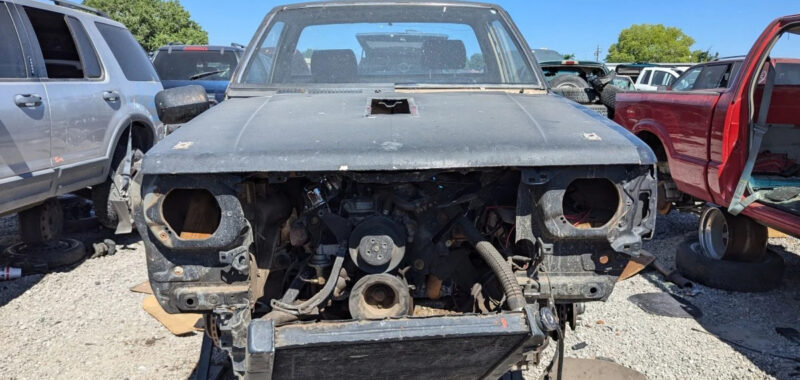Chrysler did very well selling Mitsubishi Forte pickups with Plymouth and Dodge badging in the United States, even after Mitsubishi began moving the same trucks out of their own American dealerships in 1982. The 1987 Ram 50 2WD short bed weighed in at just over 2,500 pounds, so it was reasonably perky with its 2.0-liter G63B four-banger making 90 horsepower… but there’s no replacement for displacement! At some point along the line, a Chrysler small-block V8 engine found its way into the engine compartment of this truck, now residing in a car graveyard in Sparks, Nevada.

This was the cheapest new Dodge-branded pickup Americans could buy as a 1987 model, though it had to compete with its near-identical Mitsubishi Mighty Max twin for sales.

The 1980s were great times for little pickups in the United States, but a desire for bigger cabs and more creature comforts doomed them by the dawn of the following decade.

The most interesting thing about this engine swap is that it didn’t involve a Chevrolet or Ford small-block V8. Both the Chevy small-block and Ford Windsor V8s are a few inches narrower than the Chrysler LA-series V8, which makes them easier to stuff into a small vehicle.

It appears that engine length was the critical dimension in this case, since the Mopar seems to have had enough side-to-side clearance to avoid any slicing of Mitsubishi steel to make it fit. My guess is that whoever did the swap happened to have the engine handy and that’s why it’s here. Keeping it all Dodge might have been a factor in the decision as well, though the truck’s Mitsubishi ancestry makes that unlikely.

It was over 100°F out when I found this truck, so I wasn’t motivated to check block casting numbers to determine exactly which LA engine we’re dealing with here. The easiest LAs to get cheap for the last four or so decades have been the 318 (5.1-liter) and the 360 (5.8-liter), so one of those two is the most likely candidate here.

Power levels for these engines got pretty dismal during the Malaise Era, but anyone with the wrenching skills to do this swap would have applied some basic power-enhancing wizardry before the engine went in. We can see there’s an Edelbrock Performer intake manifold, and you might as well stab in a better camshaft if you’re upgrading the intake.

How much power? With a four-barrel carburetor on a dual-plane intake plus a meaner cam, 300 to 350 horsepower is easily achieved with one of these engines, even with stock exhaust manifolds.

There’s no way even a low-profile air cleaner would have cleared the hood, so a hole had to be cut and a scoop added. That took away from the sleeper aspect of this truck, but it probably had loud exhaust anyway.

A manual transmission would have been glorious, but makes for a much tougher swap. This car has an automatic, presumably a good old Torqueflite 727 three-speed.

The end result must have been a tire-melting, fishtailing handful to drive, what with the 80/20 weight distribution and triple the factory power.

In other words, fun! Getting it to pass an emissions test in California would have been nearly impossible, but this is Nevada.

